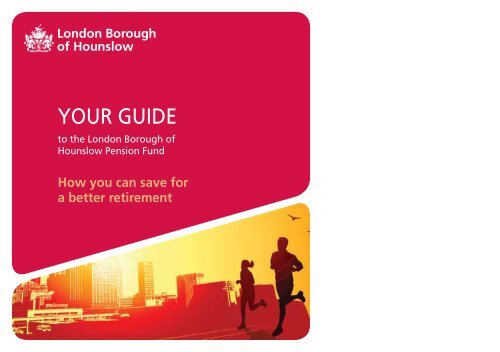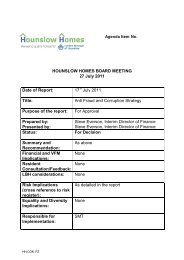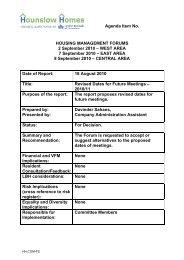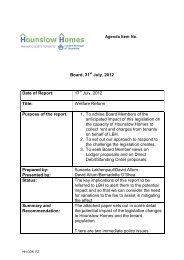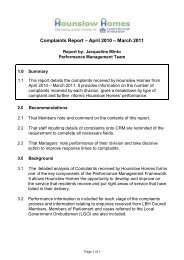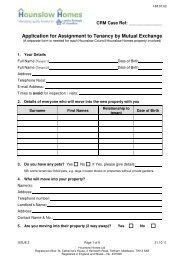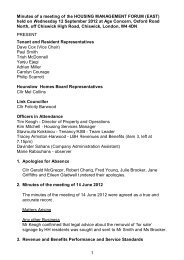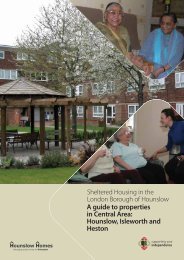Your Guide to the London Borough of Hounslow ... - Hounslow Homes
Your Guide to the London Borough of Hounslow ... - Hounslow Homes
Your Guide to the London Borough of Hounslow ... - Hounslow Homes
Create successful ePaper yourself
Turn your PDF publications into a flip-book with our unique Google optimized e-Paper software.
<strong>Your</strong> <strong>Guide</strong><strong>to</strong> <strong>the</strong> <strong>London</strong> <strong>Borough</strong> <strong>of</strong><strong>Hounslow</strong> Pension FundHow you can save fora better retirement
How you can save for a better retirement<strong>Your</strong> <strong>Guide</strong> <strong>to</strong> <strong>the</strong><strong>London</strong> <strong>Borough</strong> <strong>of</strong> <strong>Hounslow</strong>Pension Scheme (“<strong>the</strong> Pension Scheme”)ContentsWhat can <strong>the</strong> Pension Scheme do for me? 3Who can join <strong>the</strong> Pension Scheme? 5How much will it cost me? 9What happens <strong>to</strong> my benefits in <strong>the</strong> Pension Scheme if…? 13What do I get when I retire? 19Will my family be looked after if I die? 27Is <strong>the</strong>re anything else I need <strong>to</strong> know? 31
What can <strong>the</strong> Pension Scheme do for me?Regardless <strong>of</strong> how far away retirement is, you need <strong>to</strong> think about <strong>the</strong>standard <strong>of</strong> living you’d like once you s<strong>to</strong>p working. The State pensionwill provide you with a basic income, but you need <strong>to</strong> consider whe<strong>the</strong>rthis will be enough for you <strong>to</strong> live comfortably.The Pension Scheme is a final salary arrangement – this means your pension iscalculated based on your final salary and service in <strong>the</strong> Pension Scheme at retirement.There are many benefits <strong>to</strong> being a member <strong>of</strong> <strong>the</strong> Pension Scheme, including:• A secure pension• A possible tax-free lump sum• A low cost, tax efficient way <strong>to</strong> save for your retirement• Employer contributions• Life cover• An option <strong>to</strong> retire early• An option <strong>to</strong> pay extra <strong>to</strong>wards your pensionWhat can <strong>the</strong> Pension Scheme do for me?Sound <strong>to</strong>o good <strong>to</strong> be true?Read on and find out more...3
Who can join <strong>the</strong> Pension Scheme?The Pension Scheme is open <strong>to</strong> employees <strong>of</strong> <strong>the</strong> <strong>London</strong> <strong>Borough</strong> <strong>of</strong> <strong>Hounslow</strong>,<strong>Hounslow</strong> <strong>Homes</strong> and eligible employees <strong>of</strong> <strong>the</strong> various bodies that are admitted<strong>to</strong> <strong>the</strong> Pension Scheme.The current admitted bodies as at 1 April 2009 are: West Thames College, Fusion Lifestyle,John Laing Integrated Services, SITA, Continental Landscapes, Age Concern (Feltham),Scope, <strong>Hounslow</strong> Community Services and Apeti<strong>to</strong>.If you are an eligible employee <strong>of</strong> <strong>the</strong> <strong>London</strong> <strong>Borough</strong> <strong>of</strong> <strong>Hounslow</strong> or <strong>Hounslow</strong> <strong>Homes</strong>,you will au<strong>to</strong>matically be admitted <strong>to</strong> <strong>the</strong> Pension Scheme, unless you opt out using <strong>the</strong>Opt Out Form enclosed with this booklet. You can also access this form online atwww.hounslow.gov.uk/pension.Who can join <strong>the</strong> Pension Scheme?There are restrictions as <strong>to</strong> which employees <strong>of</strong> <strong>the</strong> admitted bodies can join <strong>the</strong> PensionScheme. <strong>Your</strong> HR department can advise you.5
How you can save for a better retirementMembershipAll your pensionable service with <strong>the</strong> Pension Scheme counts <strong>to</strong>wards your pension.This includes:• Any service credits following a transfer <strong>of</strong> pension rights from a previous scheme.• Any additional service you have purchased. (Added Years – this option was removedfrom <strong>the</strong> Pension Scheme on 31 March 2008. Members who previously elected <strong>to</strong>pay for Added Years can continue <strong>to</strong> do so.)• Any part-time membership, which counts at a proportionately reduced length<strong>of</strong> whole-time membership.Certain unpaid absences (except unpaid sick leave) do not count <strong>to</strong>wards your membership.I’m not a member, can I join?If you are not currently paying in<strong>to</strong> <strong>the</strong> Pension Scheme, please contact your HR department<strong>to</strong> see if you can join.6
What about my o<strong>the</strong>r pensions?You can continue <strong>to</strong> contribute <strong>to</strong> o<strong>the</strong>r pension schemes, for example, a personalpension or a stakeholder pension, whilst you are a member <strong>of</strong> <strong>the</strong> Pension Scheme.You should be aware, however, that HMRC places certain limits on <strong>the</strong> amount <strong>of</strong> taxprivilegedsavings you can make (see page 12).You may wish <strong>to</strong> transfer any previous pension rights you have in o<strong>the</strong>r schemes in<strong>to</strong><strong>the</strong> Pension Scheme, and you have 12 months from joining <strong>to</strong> do so. Transferring yourprevious benefits will enable you <strong>to</strong> buy extra membership in <strong>the</strong> Pension Scheme. Atretirement, your pension will be based on your <strong>to</strong>tal service (including <strong>the</strong> extra servicebought with <strong>the</strong> transfer value) and your final pay (this is your pay during <strong>the</strong> final year <strong>of</strong>your membership in <strong>the</strong> Pension Scheme, or one <strong>of</strong> <strong>the</strong> previous two years if this is higher)on leaving your job.Please note, however, that you cannot transfer any pension credit resulting from a divorcein<strong>to</strong> <strong>the</strong> Pension Scheme.If you require any fur<strong>the</strong>r information or are interested in transferring benefits in<strong>to</strong> <strong>the</strong>Pension Scheme, please contact Capita Hartshead, whose contact details can be foundon page 33.7
How you can save for a better retirementRemember <strong>to</strong>…complete an Expression <strong>of</strong> Wish Form <strong>to</strong> help <strong>the</strong> <strong>London</strong> <strong>Borough</strong> <strong>of</strong><strong>Hounslow</strong> <strong>to</strong> decide who should receive any benefits payable in <strong>the</strong> even<strong>to</strong>f your death. The <strong>London</strong> <strong>Borough</strong> <strong>of</strong> <strong>Hounslow</strong> has full discretion overwho receives any benefits, meaning <strong>the</strong> lump sum can normally be paid free<strong>of</strong> Inheritance Tax. However, your wishes will be taken in<strong>to</strong> account so it isimportant that you keep <strong>the</strong> form up-<strong>to</strong>-date.An Expression <strong>of</strong> Wish Form is enclosed with this booklet or available onlineat www.hounslow.gov.uk/pension.Once I’ve joined, what communications will I receive?You will receive a statu<strong>to</strong>ry notification informing you <strong>of</strong> your membership in <strong>the</strong> PensionScheme. You will also receive an annual benefit statement which will provide you withprojections <strong>of</strong> your pension at retirement, as well as <strong>the</strong> Pension Scheme’s annual membernewsletter, which will keep you up-<strong>to</strong>-date with news from <strong>the</strong> Pension Scheme.8
How much will it cost me?By paying in<strong>to</strong> <strong>the</strong> Pension Scheme, you are taking important steps <strong>to</strong>wardssecuring your financial future.• You pay contributions depending on <strong>the</strong> pay band your job falls in<strong>to</strong>• <strong>Your</strong> contributions receive tax relief• <strong>Your</strong> employer also pays contributions in<strong>to</strong> <strong>the</strong> Pension Scheme• You can pay additional contributions <strong>to</strong> <strong>to</strong>p up your benefitsHow much will it cost me?9
How you can save for a better retirementHow much do I pay?The contribution rate you pay depends on your full-time equivalent salary (including all permanentpensionable allowances) and <strong>the</strong> corresponding pay band you fall in<strong>to</strong>. If you work part-time, thiswill be how much you would earn each year for doing your job full-time.If you have more than one job, each is considered separately.The contribution bands effective from 1 April 2009 are as follows (please note that <strong>the</strong>se willincrease each year in line with inflation):Band Full-time equivalent salary range Contribution rate1 £0 - £12,600 5.5%2 More than £12,601 up <strong>to</strong> £14,700 5.8%3 More than £14,701 up <strong>to</strong> £18,900 5.9%4 More than £18,901 up <strong>to</strong> £31,500 6.5%5 More than £31,501 up <strong>to</strong> £42,000 6.8%6 More than £42,001 up <strong>to</strong> £78,700 7.2%7 More than £78,700 7.5%If you are a protected manual worker and you were paying 5% contributions before 1 April 2008,your contributions are being increased on a phased basis over <strong>the</strong> three years beginning 1 April 2008.By <strong>the</strong> end <strong>of</strong> that period your contributions will be in line with <strong>the</strong> contribution bands set out above.The contribution band you fall in<strong>to</strong> may be reviewed following a change in your contractualcircumstances and/or on a more regular basis as determined by your employer.10
Look at what you save!The actual cost <strong>of</strong> membership <strong>to</strong> you is reduced because you receive tax relief on yourcontributions. For every £1 you pay, your take-home pay is only reduced by 80p if you are abasic rate tax payer, because you receive tax relief <strong>of</strong> 20% (higher rate tax payers may also beeligible for fur<strong>the</strong>r tax relief).Can I pay more?Increasing your pension contributions is a tax efficient way <strong>of</strong> boosting <strong>the</strong> pension you willreceive at retirement.You can pay contributions in excess <strong>of</strong> your basic Pension Scheme contribution by:• Paying Additional Voluntary Contributions (AVCs)• Paying more contributions in order <strong>to</strong> buy up <strong>to</strong> £5,000 <strong>of</strong> extra annual pensionin multiples <strong>of</strong> £250Paying Additional Voluntary Contributions (AVCs)If you wish, you can boost your pension by paying AVCs up <strong>to</strong> a maximum <strong>of</strong> 50% <strong>of</strong> yourpensionable earnings. You decide how much <strong>to</strong> pay each month and this amount will be investedfor you in your own policy with our in-house AVC provider. You can also take a percentage <strong>of</strong>your AVC fund as a tax-free lump sum upon retirement depending on your circumstances.Please note that <strong>the</strong> value <strong>of</strong> this investment, as with all investments, can go down as well as up,and you may not get back <strong>the</strong> amount originally invested.11
How you can save for a better retirementPaying extra contributionsYou can elect <strong>to</strong> pay extra contributions (in bands <strong>of</strong> £250 per annum) in order <strong>to</strong> buy anadditional annual pension from £250 - £5,000 per annum. By doing this, you can provide extrapension for yourself and, if you wish, extra survivors’ pensions on your death.For more details on <strong>the</strong>se options, please contact Capita Hartshead, whose contact details can befound on page 33.Are <strong>the</strong>re limits <strong>to</strong> how much I can save?The Annual AllowanceThe Government introduced <strong>the</strong> AnnualAllowance in April 2006. This limit means thatyou only receive tax relief on <strong>the</strong> growth <strong>of</strong> <strong>the</strong>value <strong>of</strong> your pension savings up <strong>to</strong> <strong>the</strong> lower<strong>of</strong> 100% <strong>of</strong> your yearly earnings (or £3,600if greater), and <strong>the</strong> Annual Allowance. TheAnnual Allowance for <strong>the</strong> tax year 2009/10stands at £245,000. Tax charges could arise if<strong>the</strong> <strong>to</strong>tal increase in <strong>the</strong> value <strong>of</strong> your pensionsavings in a year exceeds <strong>the</strong> Annual Allowance.Please note that this limit applies <strong>to</strong> <strong>the</strong>aggregate <strong>to</strong>tal <strong>of</strong> all your pension contributions<strong>to</strong> every pension scheme you contribute <strong>to</strong>, notjust your Pension Scheme pension, and includescontributions paid by your employer.The Lifetime AllowanceThe Government introduced <strong>the</strong> LifetimeAllowance in April 2006 – this limits <strong>the</strong> <strong>to</strong>talamount <strong>of</strong> tax-privileged benefits you can buildup throughout your working lifetime. For <strong>the</strong>tax year 2009/10 <strong>the</strong> Lifetime Allowance standsat £1.75 million. If your <strong>to</strong>tal pension fundexceeds this amount when you retire, your fundmay be subject <strong>to</strong> a tax charge <strong>of</strong> up <strong>to</strong> 55%on <strong>the</strong> excess.Please note that this limit applies <strong>to</strong> <strong>the</strong>aggregate <strong>to</strong>tal <strong>of</strong> all <strong>the</strong> pension funds youhold, not just your Pension Scheme pension.12
What happens <strong>to</strong> my benefits in<strong>the</strong> Pension Scheme if...?We know that throughout your working lifetime <strong>the</strong>re will be times when youare absent from work or your personal circumstances change. These are coveredin this section. What happens if…• You leave <strong>the</strong> Pension Scheme?• You are <strong>of</strong>f work on family leave or through sickness absence?• You get divorced?What happens <strong>to</strong> my benefits in <strong>the</strong> Pension Scheme if...?13
How you can save for a better retirementIf you leave <strong>the</strong> Pension Scheme before you are due <strong>to</strong> retire, you will have a number <strong>of</strong>options depending on how long you have been a member <strong>of</strong> <strong>the</strong> Pension Scheme.If you leave <strong>the</strong> Pension Scheme withless than three months’ service…You will be entitled <strong>to</strong> a choice <strong>of</strong> <strong>the</strong> following:• A refund <strong>of</strong> <strong>the</strong> contributions you havepaid in<strong>to</strong> <strong>the</strong> Pension Scheme, less taxand o<strong>the</strong>r statu<strong>to</strong>ry deductions.• A transfer <strong>of</strong> <strong>the</strong> benefits you haveaccrued in <strong>the</strong> Pension Scheme (includingyour contributions and <strong>the</strong> contributions<strong>of</strong> your employer) <strong>to</strong> ano<strong>the</strong>r pensionarrangement, if <strong>the</strong>y are able and willing<strong>to</strong> accept it.• A deferred refund, meaning you candelay your decision until you decidewhat you would like <strong>to</strong> do.If you leave <strong>the</strong> Pension Scheme withthree months’ service or more…You will be entitled <strong>to</strong> a choice <strong>of</strong> <strong>the</strong> following:• A transfer <strong>of</strong> <strong>the</strong> benefits you haveaccrued in <strong>the</strong> Pension Scheme <strong>to</strong>ano<strong>the</strong>r pension arrangement.• A deferred benefit in <strong>the</strong> PensionScheme. <strong>Your</strong> benefits will be kept foryou in <strong>the</strong> Pension Scheme until you retire,and will increase every year in line with <strong>the</strong>cost <strong>of</strong> living.14
I’ve decided <strong>to</strong> transfer out <strong>of</strong> <strong>the</strong>Pension Scheme, what happens next?Capita Hartshead will provide you with a cashequivalent value <strong>of</strong> your benefits at <strong>the</strong> time<strong>of</strong> transfer (provided that you do not leave <strong>the</strong>Pension Scheme within one year <strong>of</strong> your 65thbirthday). The quotation will be valid for threemonths from <strong>the</strong> date <strong>of</strong> calculation. You will alsobe provided with information on what will happenif you decide <strong>to</strong> proceed with <strong>the</strong> transfer.Please remember that it may not be in your bestinterests <strong>to</strong> transfer <strong>the</strong> benefits you have builtup in <strong>the</strong> Pension Scheme and you should seekindependent financial advice before makingthis decision. For details on how <strong>to</strong> find anIndependent Financial Adviser (IFA) in yourlocal area, please see page 33.Can I leave <strong>the</strong> Pension Scheme butremain in employment?If you decide you no longer wish <strong>to</strong> be a member<strong>of</strong> <strong>the</strong> Pension Scheme, you can opt out from yournext available pay period. However, you will onlybe allowed <strong>to</strong> rejoin at a later date as long as youhave a contract <strong>of</strong> employment <strong>of</strong> at least threemonths, you are under age 75, and <strong>the</strong> <strong>London</strong><strong>Borough</strong> <strong>of</strong> <strong>Hounslow</strong> allows you <strong>to</strong> do so.If you are considering opting out <strong>of</strong> <strong>the</strong> PensionScheme, we would urge you <strong>to</strong> talk <strong>to</strong> an IFA first(please see page 33).15
How you can save for a better retirementFamily-related leave and long-term sickness absenceThere may be times when you are <strong>of</strong>f work during your membership <strong>of</strong> <strong>the</strong> Pension Scheme.Some <strong>of</strong> <strong>the</strong> main reasons for absence are covered below.Maternity leaveDuring both your ordinary maternity leave and your additionalmaternity leave, your membership <strong>of</strong> <strong>the</strong> Pension Scheme willcontinue and your pension contributions will be based on <strong>the</strong>actual pay you receive during this time. Any unpaid leave youtake will not count <strong>to</strong>wards your membership <strong>of</strong> <strong>the</strong> PensionScheme. Upon returning <strong>to</strong> work, you can choose <strong>to</strong> repaypension contributions <strong>to</strong> cover <strong>the</strong> unpaid period. If you optnot <strong>to</strong> repay <strong>the</strong> missing contributions, <strong>the</strong> unpaid periodwill show as a break in your service and your benefits will bereduced accordingly.Similar provisions apply <strong>to</strong> paternity leave and adoption leave.16
Authorised unpaid leaveIf you are granted unpaid leave <strong>of</strong> absence or leave on reduced pay (including parental leave):For <strong>the</strong> first 30 daysFull membership continues <strong>to</strong> build up duringthis period, but you must pay <strong>the</strong> pensioncontributions that would have been paidhad you been at work.After 30 daysThis period will not count as membershipunless you pay for it <strong>to</strong> do so. You can elect <strong>to</strong>pay contributions for <strong>the</strong> whole period <strong>of</strong> yourabsence, up <strong>to</strong> a maximum <strong>of</strong> three years, andmaintain your full pension benefits.For <strong>the</strong> period <strong>to</strong> count <strong>to</strong>wards yourmembership, you must pay <strong>the</strong> contributions thatyou would have paid if you had been at work.Strike actionAbsence from work for one or more whole daysdue <strong>to</strong> strike action will not count <strong>to</strong>wardsyour membership <strong>of</strong> <strong>the</strong> Pension Scheme. Youwill have <strong>to</strong> pay back contributions at a specialrate <strong>to</strong> cover <strong>the</strong> employer’s contribution inrespect <strong>of</strong> this period if you want <strong>to</strong> be creditedfor this service.Sickness absence<strong>Your</strong> membership in <strong>the</strong> Pension Schemeis not affected by sickness absence. <strong>Your</strong>benefits will continue as normal and you willcontinue <strong>to</strong> pay contributions on any pay youreceive when you are <strong>of</strong>f sick.17
How you can save for a better retirementI’m getting a divorce – what will happen <strong>to</strong> my pension?Upon divorce or annulment <strong>of</strong> a civil partnership, <strong>the</strong>re are various ways in which your pension rightscan be divided. You can:• Offset your pension rights against <strong>the</strong> value <strong>of</strong> o<strong>the</strong>r financial assets in your divorceor annulment settlement;• Use an earmarking order, whereby <strong>the</strong> benefits earmarked for your ex-spouse or ex-civil partnerwill be paid <strong>to</strong> him or her when your benefits are paid; or• Use a pension sharing order, meaning part <strong>of</strong> your benefits will be transferred <strong>to</strong> your ex-spouseor ex-civil partner at <strong>the</strong> time <strong>of</strong> <strong>the</strong> divorce or annulment.<strong>Your</strong> legal adviser will tell you more about <strong>the</strong>se options if <strong>the</strong>y are relevant <strong>to</strong> you. You should contactCapita Hartshead for more details on pension sharing on divorce should it become necessary. Please note<strong>the</strong>re may be a charge for <strong>the</strong> provision <strong>of</strong> calculations setting out how your pension rights may be divided.18
What do I get when I retire?As a member <strong>of</strong> <strong>the</strong> Pension Scheme, you have several options at retirement.You will have <strong>the</strong> option:• To retire early• To retire late• To take flexible retirement at your employer’s discretionAnd you will receive:What do I get when I retire?• A pension for life• A possible tax-free pension commencement lump sum• An ill health early retirement pension if you are certified as permanentlyincapable <strong>of</strong> carrying out your job19
How you can save for a better retirementWhat will I get if I retire at age 65?If you retire at your Normal Retirement Age (age 65), you will receive a pension based on <strong>the</strong> length <strong>of</strong> time youhave been a member <strong>of</strong> <strong>the</strong> Pension Scheme (in years and days) and your final pay. For service up <strong>to</strong> 31 March2008, your pension is based on 1/80th <strong>of</strong> your final pay. For service after 1 April 2008, your pension is based on1/60th <strong>of</strong> your final pay.ExampleIf you have been a member <strong>of</strong> <strong>the</strong> Pension Scheme for 15 yearsand 5 days up <strong>to</strong> 31 March 2008 and your final pay is £25,000,your pension will be worked out as:1/80 x 25,000 x 15 5/365 = £4,691.78 p.a.For service after 1 April 2008, if you have 10 years 18 days <strong>of</strong>service for example, your pension will be worked out as:1/60 x 25,000 x 10 18/365 = £4,187.21 p.a.<strong>Your</strong> <strong>to</strong>tal pension would <strong>the</strong>refore be:£4,691.78 + £4,187.21 = £8,878.99 p.a.20
Will my pension increase?<strong>Your</strong> pension will increase in line with <strong>the</strong> cost <strong>of</strong> living throughout your retirement. Please note that if youretire under <strong>the</strong> age <strong>of</strong> 55, pension increases will only be paid from your 55th birthday onwards.Pension Commencement Lump Sum (PCLS)As well as <strong>the</strong> pension you will receive at retirement, you will also receive a tax-free pension commencementlump sum (PCLS), normally equal <strong>to</strong> three times your annual pension (for service up <strong>to</strong> 31 March 2008).Additionally, if you were <strong>to</strong> give up part <strong>of</strong> your annual pension, you could receive a higher tax-free pensioncommencement lump sum <strong>of</strong> up <strong>to</strong> 25% <strong>of</strong> <strong>the</strong> value <strong>of</strong> your pension benefits (for service after 1 April 2008).For every £1 <strong>of</strong> pension you give up, you can gain an additional £12 <strong>of</strong> lump sum.Can I retire early?You can elect <strong>to</strong> retire and receive your benefits from age 60 onwards. You may be able <strong>to</strong> retire and receiveyour benefits from age 55 (or from age 50 if you joined <strong>the</strong> Pension Scheme before 1 April 2008 and retire andelect <strong>to</strong> receive your benefits before 1 April 2010), but only if your employer agrees.<strong>Your</strong> benefits may be reduced <strong>to</strong> reflect <strong>the</strong> longer period over which <strong>the</strong>y are likely <strong>to</strong> be paid. This reductionis not applicable if you are made redundant or retire early at <strong>the</strong> request <strong>of</strong> your employer.21
How you can save for a better retirementThe Rule <strong>of</strong> 85The Rule <strong>of</strong> 85 means that if you are over 60 and your age plus your length <strong>of</strong> pensionable service equals 85or more, you can retire before age 65 with unreduced benefits. For instance, an employee aged 60 who has25 years <strong>of</strong> qualifying service could retire with an unreduced pension. You should note that <strong>the</strong> Rule <strong>of</strong> 85does not affect your right <strong>to</strong> retire at 60 – only <strong>the</strong> amount <strong>of</strong> benefits you may receive in some cases.The Government’s legal advice is that <strong>the</strong> Rule <strong>of</strong> 85 is in breach <strong>of</strong> Age Discrimination legislation whichcame in<strong>to</strong> force on 1 Oc<strong>to</strong>ber 2006. For this reason <strong>the</strong> Rule <strong>of</strong> 85 has now been removed, but only inrespect <strong>of</strong> <strong>the</strong> benefits you build up in <strong>the</strong> future.The pension rights accrued by members up <strong>to</strong> 31 March 2008 (or up <strong>to</strong> 31 March 2016 if you will beaged 60 or over by <strong>the</strong>n) will not be affected and will continue <strong>to</strong> be calculated in <strong>the</strong> same way as if<strong>the</strong> changes had not been made.There is protection for members <strong>of</strong> <strong>the</strong> Pension Scheme with service before 1 April 2008. However,this is a complicated subject and if you are unsure how <strong>the</strong> Rule <strong>of</strong> 85 affects you, you should contactCapita Hartshead.22
If you retire due <strong>to</strong> ill healthTo qualify for an ill health early retirement pension, you must be permanently incapable <strong>of</strong> carrying out <strong>the</strong>duties <strong>of</strong> your current employment, and have a reduced likelihood <strong>of</strong> obtaining gainful employment (whe<strong>the</strong>rin local government or o<strong>the</strong>rwise) before your Normal Retirement Age (age 65).An independent registered medical practitioner must certify when it is likely, if ever, that you will be able <strong>to</strong>obtain gainful employment. Depending on this assessment, you will be placed in<strong>to</strong> one <strong>of</strong> three ill health tiersand receive your benefits accordingly.The three tiers for ill health benefits are:Tier 1 – you have no reasonable prospect <strong>of</strong> obtaining gainful employment before Normal Retirement Age.• <strong>Your</strong> accrued benefits are enhanced by 100% <strong>of</strong> potential membership from your date <strong>of</strong> leaving <strong>to</strong>Normal Retirement Age.Tier 2 – you cannot obtain gainful employment within a reasonable period <strong>of</strong> leaving nor are likely <strong>to</strong> beable <strong>to</strong> do so before Normal Retirement Age.• <strong>Your</strong> accrued benefits are enhanced by 25% <strong>of</strong> potential membership from your date <strong>of</strong> leaving <strong>to</strong>Normal Retirement Age.• There is protection for active members <strong>of</strong> <strong>the</strong> LGPS who were aged 45 or above on 31 March 2008, andwho subsequently retire on <strong>the</strong> grounds <strong>of</strong> ill health. These members must not be worse <strong>of</strong>f than <strong>the</strong>ywould have been under <strong>the</strong> 1997 Scheme. Therefore, a comparison <strong>of</strong> <strong>the</strong> enhancement <strong>of</strong> potentialmembership will be performed and <strong>the</strong> member will receive <strong>the</strong> greater <strong>of</strong> <strong>the</strong> two enhancements.23
How you can save for a better retirementTier 3 – you can obtain gainful employment within a reasonable period <strong>of</strong> leaving.• You will receive your accrued benefits only. <strong>Your</strong> pension will cease upon your obtaininggainful employment.An ill health early retirement pension is never reduced for early payment.What if I want <strong>to</strong> continue working after age 65?If you carry on working after age 65, you can continue <strong>to</strong> pay in<strong>to</strong> <strong>the</strong> Pension Scheme and build up fur<strong>the</strong>rbenefits until you choose <strong>to</strong> retire or reach age 75, when you will be paid a late retirement pension. Youcannot defer payment <strong>of</strong> your pension after age 75. If you choose late retirement, your pension will be paidat an increased rate <strong>to</strong> reflect <strong>the</strong> fact that it will be paid for a shorter time.What if I want <strong>to</strong> continue working but also receive my pension benefits – flexible retirement?Under this option, you can apply for whole or partial flexible retirement, and you will be awarded all or par<strong>to</strong>f your retirement pension with <strong>the</strong> Pension Scheme whilst continuing <strong>to</strong> be employed by your employer.<strong>Your</strong> hours <strong>of</strong> work or <strong>the</strong> grade in which you are employed will be reduced accordingly. If you opt <strong>to</strong> takeflexible retirement you can take your benefits from age 55 from 1 April 2010 (for active members at 31 March2008, <strong>the</strong> earliest retirement age is 50). You should also note that your accrued benefits may be reduced at <strong>the</strong>discretion <strong>of</strong> your employer.24
What State pension will I receive?The State currently provides a two-part retirement pension:• The Basic State Pension• The State Second Pension (S2P)The Basic State PensionThe Basic State Pension is a flat-rate pension payable from State Pension Age (SPA). It is paid <strong>to</strong> everyonewho has paid sufficient National Insurance contributions in his or her working life. The Basic State Pensionis currently increased each April in line with retail prices.You can check your National Insurance contributions record through your local Department for Work andPensions (DWP) <strong>of</strong>fice, or by contacting <strong>the</strong> DWP on 0845 3000 168. You can also obtain a State pensionforecast online at www.<strong>the</strong>pensionservice.gov.uk.The State Second Pension (S2P)S2P was introduced in April 2002, replacing <strong>the</strong> State Earnings Related Pension Scheme (SERPS). It provides anadditional component <strong>of</strong> pension from SPA. It is based on your earnings, taken from your National Insurancerecords. As with <strong>the</strong> Basic State Pension, you can check your own position online, or with your local DWP <strong>of</strong>fice.25
How you can save for a better retirementContracting out <strong>of</strong> S2PThe Pension Scheme is contracted out <strong>of</strong> S2P meaning you will not earn S2P benefits but will instead payreduced rate National Insurance contributions.Important information about State Pension AgeSPA is 65 for men and 60 for women born before 1950. Between 2010 and 2020, <strong>the</strong> SPA for women will risegradually <strong>to</strong> 65. For women born after 1955, <strong>the</strong> SPA is 65. Women born between 6 April 1950 and 5 April1955 will have a SPA between 60 and 65.SPA will rise gradually <strong>to</strong> 68 for both men and women between 2024 and 2046.26
Will my family be looked after if I die?Whe<strong>the</strong>r you die before or after retirement, valuable benefits may be provided for yourdependants, including:• A spouse’s/civil partner’s/nominated cohabiting partner’s pension, payable for <strong>the</strong> rest <strong>of</strong> his or her life• Children’s pensions, payable until age 17, or longer if in full-time education• A lump sum death grantWill my family be looked after if I die?27
How you can save for a better retirementWhat happens if I die in service?If you die in service, your family will receive:• A lump sum death grantA death grant <strong>of</strong> three years’ salary will be paid as a lump sum <strong>to</strong> your dependants.If you work part-time, your dependants will receive a lump sum <strong>of</strong> three times your actual part-time pay.• An ongoing pension for your husband, wife, or civil partner (or, subject <strong>to</strong> certain qualifying conditions,a cohabiting partner)The table below shows <strong>the</strong> amount <strong>of</strong> pension payable <strong>to</strong> your dependants. The pension will be payablefrom <strong>the</strong> date <strong>of</strong> your death, generally payable for <strong>the</strong> rest <strong>of</strong> your husband’s, wife’s, civil partner’s orcohabiting partner’s life, and will increase each year in line with <strong>the</strong> cost <strong>of</strong> living.For your wife For your husband For your civil partner (ornominated cohabiting partner*)A pension equal <strong>to</strong> 1/160th <strong>of</strong>your final pay at <strong>the</strong> date <strong>of</strong> yourdeath, times <strong>the</strong> <strong>to</strong>tal service youwould have built up in <strong>the</strong> PensionScheme <strong>to</strong> age 65.A pension equal <strong>to</strong> 1/160th <strong>of</strong>your final pay at <strong>the</strong> date <strong>of</strong> yourdeath, times <strong>the</strong> <strong>to</strong>tal service youwould have built up in <strong>the</strong> PensionScheme <strong>to</strong> age 65, but includingservice from 1 April 1972 if youjoined before this date.A pension equal <strong>to</strong> 1/160th <strong>of</strong>your final pay at <strong>the</strong> date <strong>of</strong> yourdeath, times <strong>the</strong> <strong>to</strong>tal service youwould have built up in <strong>the</strong> PensionScheme <strong>to</strong> age 65, but includingservice only from 6 April 1988.* The LGPS has set out a number <strong>of</strong> qualifying conditions which must be met, for a continuous period <strong>of</strong> at least two years from <strong>the</strong>date <strong>of</strong> nomination and at <strong>the</strong> date <strong>of</strong> your death, in order for a nominated cohabiting partner benefit <strong>to</strong> be paid. You can obtain aNominated Cohabiting Partner Form from Capita Hartshead (contact details on page 33).28
Children’s pensions for any eligible childrenEligible children are your own, adopted, or certain o<strong>the</strong>r children who depend on you financially and are under <strong>the</strong>age <strong>of</strong> 17. However, <strong>the</strong>y may be over 17 in certain circumstances, for example, if <strong>the</strong>y are in full-time education.You should also note that <strong>the</strong> children must have been born before your death or within a year <strong>of</strong> it.The amount <strong>of</strong> pension your eligible children would receive depends on <strong>the</strong> number <strong>of</strong> children you have.If your husband, wife, civil partner or nominatedcohabiting partner is receiving a pensionOne child would receive 1/320th <strong>of</strong> your final paytimes <strong>the</strong> membership you would have built up <strong>to</strong>age 65, while two or more children would receive1/160th shared equally between <strong>the</strong>m.If no pension is payable <strong>to</strong> a husband, wife,civil partner or nominated cohabiting partnerOne child would receive 1/240th <strong>of</strong> your final paytimes <strong>the</strong> membership you would have built up <strong>to</strong>age 65, while two or more children would receive1/120th shared equally between <strong>the</strong>m.29
How you can save for a better retirementWhat happens if I die after retirement?If you die in retirement, your family will receive:• An ongoing pension for your husband, wife, civil partner or nominated cohabiting partner, as describedon page 28• Children’s pensions for your eligible children, as described on page 29Plus• A lump sum death grantIf you die within ten years <strong>of</strong> retiring, a lump sum death grant equal <strong>to</strong> <strong>the</strong> remaining pension paymentswhich would have been paid <strong>to</strong> you for <strong>the</strong> remainder <strong>of</strong> <strong>the</strong> ten years will be paid <strong>to</strong> your dependants,provided you are under age 75.It is crucial that you complete an Expression <strong>of</strong> Wish Form <strong>to</strong> help <strong>the</strong> <strong>London</strong> <strong>Borough</strong> <strong>of</strong> <strong>Hounslow</strong> decidewho should receive any benefits payable in <strong>the</strong> event <strong>of</strong> your death. The <strong>London</strong> <strong>Borough</strong> <strong>of</strong> <strong>Hounslow</strong> has fulldiscretion over who receives any benefits, meaning <strong>the</strong> lump sum can normally be paid free <strong>of</strong> Inheritance Tax.However, your wishes will be taken in<strong>to</strong> account and so it is important that you keep <strong>the</strong> form up-<strong>to</strong>-date. Youcan obtain a form Capita Hartshead.30
Is <strong>the</strong>re anything else I need <strong>to</strong> know?The <strong>of</strong>ficial rules <strong>of</strong> <strong>the</strong> LGPS are long and complicated.We’ve covered <strong>the</strong> main rules in brief so far, but you’llfind some additional information on <strong>the</strong> followingin this section:• How <strong>the</strong> Pension Scheme is run• Capita Hartshead, <strong>the</strong> Pension Scheme Administra<strong>to</strong>r• How <strong>to</strong> find an Independent Financial Adviser• TPAS, <strong>the</strong> Pensions Ombudsman, TPR and <strong>the</strong> Pension Tracing ServiceIs <strong>the</strong>re anything else I need <strong>to</strong> know?31
How you can save for a better retirementHow <strong>the</strong> Pension Scheme is runThe Pension Scheme is governed by <strong>the</strong> rules <strong>of</strong> <strong>the</strong> Local Government Pension Scheme (LGPS).Tax approvalThe <strong>London</strong> <strong>Borough</strong> <strong>of</strong> <strong>Hounslow</strong> Pension Scheme is registered for tax purposes with HMRC. This enables contributions <strong>to</strong><strong>the</strong> Pension Scheme and investment growth within it <strong>to</strong> benefit from favourable tax treatment.Please note that <strong>the</strong> tax treatment <strong>of</strong> contributions <strong>to</strong> <strong>the</strong> Pension Scheme and benefits arising from it are subject <strong>to</strong> anyfuture changes in legislation.<strong>Your</strong> personal details are secureUnder <strong>the</strong> Data Protection Act 1998, you and your family have rights <strong>to</strong> ensure that all data held about you is obtained andprocessed lawfully and fairly. No personal data concerning you or your dependants will be processed without your or <strong>the</strong>irconsent, unless it is necessary for <strong>the</strong> purpose <strong>of</strong> administering your benefits and in your interests.Unless we hear from you saying o<strong>the</strong>rwise, we will assume you consent <strong>to</strong> us using your personal data for <strong>the</strong> purposes <strong>of</strong>administering your benefits. If, however, you do not consent <strong>to</strong> this, you must write <strong>to</strong> tell us. Please note that <strong>the</strong> <strong>London</strong><strong>Borough</strong> <strong>of</strong> <strong>Hounslow</strong> will <strong>the</strong>n be entitled <strong>to</strong> withhold or reduce your benefits until you consent <strong>to</strong> it processing your data.32
Planning for retirement can be a complicated issue, but <strong>the</strong>re are people who can help you <strong>to</strong> understandand make <strong>the</strong> most <strong>of</strong> your saving for retirement.<strong>Your</strong> first port <strong>of</strong> callCapita Hartshead undertakes <strong>the</strong> day-<strong>to</strong>-day administration <strong>of</strong> <strong>the</strong> Pension Scheme and is <strong>the</strong> first point <strong>of</strong> contact formembers with queries about <strong>the</strong>ir benefits. You can contact <strong>the</strong> LBOH Administration Team at <strong>the</strong> address below:LBOH Administration TeamCapita Hartshead, PO Box 195, Mowden Hall, Darling<strong>to</strong>n DL1 9FSTelephone: 01737 366032/035Email: hounslow.pensions@capita.co.uk.Finding an Independent Financial AdviserNei<strong>the</strong>r <strong>the</strong> team at Capita Hartshead, nor <strong>the</strong> <strong>London</strong> <strong>Borough</strong> <strong>of</strong> <strong>Hounslow</strong>, are qualified <strong>to</strong> provide advice on yourbenefits. If you do not already have an Independent Financial Adviser (IFA), you can find one local <strong>to</strong> you by visitingwww.unbiased.co.uk.Who do I need <strong>to</strong> contact if I have a complaint?The Pension Scheme is keen <strong>to</strong> ensure that all members receive a high level <strong>of</strong> service with regard <strong>to</strong> <strong>the</strong>ir pension matters.If, however, you are unhappy with any aspect <strong>of</strong> <strong>the</strong> Pension Scheme, you should follow its Internal Dispute ResolutionProcedure (IDRP), which has been put in place for <strong>the</strong> benefit <strong>of</strong> you and your dependants.Whatever <strong>the</strong> problem, you should first discuss <strong>the</strong> matter with Capita Hartshead. If your problem cannot be resolved atthis stage, Capita Hartshead will inform you on how <strong>to</strong> proceed with <strong>the</strong> IDRP.33
How you can save for a better retirementThe Pensions Advisory ServiceThe Pensions Advisory Service (TPAS) is an independen<strong>to</strong>rganisation available at any time <strong>to</strong> assist pension schememembers and beneficiaries with queries or difficulties <strong>the</strong>yhave failed <strong>to</strong> resolve with <strong>the</strong>ir administra<strong>to</strong>r or scheme.TPAS can be contacted at <strong>the</strong> following address:The Pensions Advisory Service11 Belgrave Road, <strong>London</strong> SW1V 1RBTelephone: 0845 601 2923Website: www.pensionsadvisoryservice.org.ukThe Pensions OmbudsmanThe Pensions Ombudsman can investigate and determine anycomplaint or dispute involving maladministration or matters<strong>of</strong> fact <strong>of</strong> law, where <strong>the</strong> complaint has first been subject <strong>to</strong><strong>the</strong> Pension Scheme’s IDRP and passed <strong>to</strong> TPAS. The decisionis final and binding.The Pensions Ombudsman can be contacted at <strong>the</strong>following address:The Pensions Regula<strong>to</strong>rThe Pensions Regula<strong>to</strong>r (TPR) is able <strong>to</strong> intervene in<strong>the</strong> running <strong>of</strong> a scheme where trustees, employers,or pr<strong>of</strong>essional advisers have failed in <strong>the</strong>ir duties.TPR can be contacted at <strong>the</strong> following address:The Pensions Regula<strong>to</strong>rNapier House, Trafalgar Place, Brigh<strong>to</strong>n BN1 4DWTelephone: 01273 811 800Website: www.<strong>the</strong>pensionsregula<strong>to</strong>r.gov.ukThe Pension Tracing ServiceYou can also contact <strong>the</strong> Pension Tracing Service, who maybe able <strong>to</strong> help you if you have lost <strong>to</strong>uch with a previouspension scheme. You can contact <strong>the</strong>m at:The Pension ServiceTyneview Park, Whitley Road,Newcastle upon Tyne NE98 1BAWebsite: www.<strong>the</strong>pensionservice.gov.ukThe Pensions Ombudsman11 Belgrave Road, <strong>London</strong> SW1V 1RBTelephone: 020 630 2200Website: www.pensions-ombudsman.org.uk34
This booklet is not binding on <strong>the</strong> <strong>London</strong> <strong>Borough</strong> <strong>of</strong> <strong>Hounslow</strong> and if anydiscrepancy exists between this booklet and <strong>the</strong> rules <strong>of</strong> <strong>the</strong> LGPS, <strong>the</strong> ruleswill apply. These rules are governed by legislation, and you will be informed<strong>of</strong> any changes affecting your membership. The content <strong>of</strong> this booklet isbased on our understanding <strong>of</strong> current legislation as at 1 April 2008.


